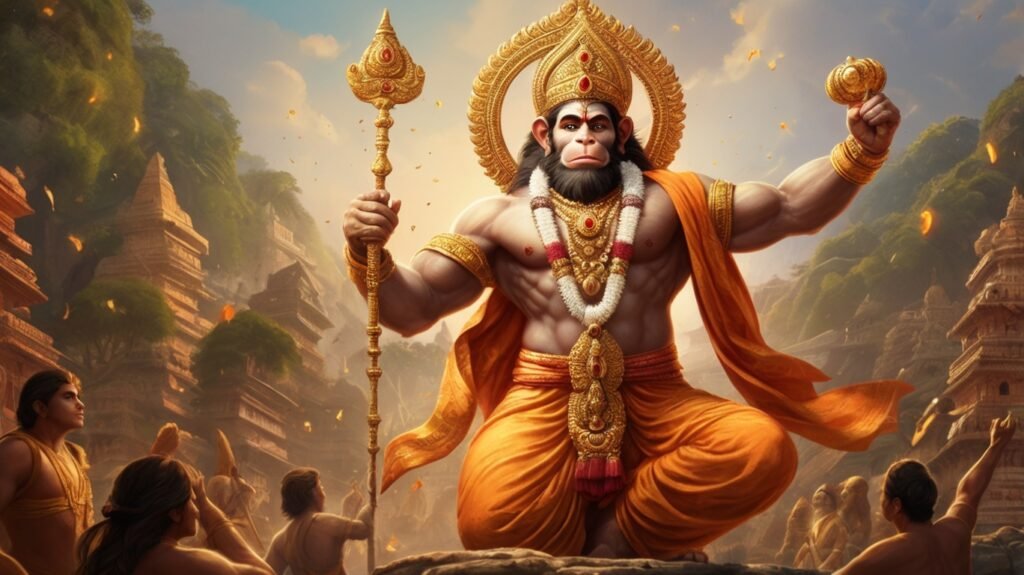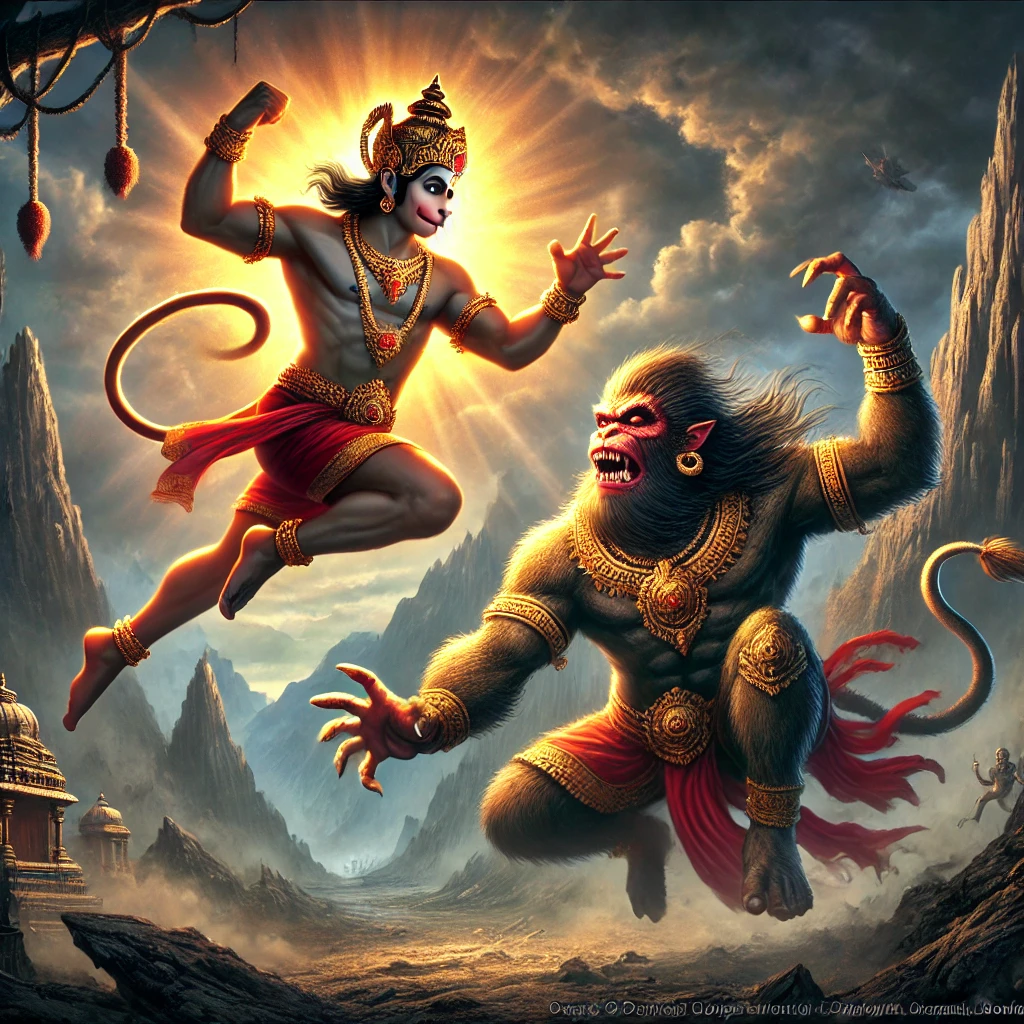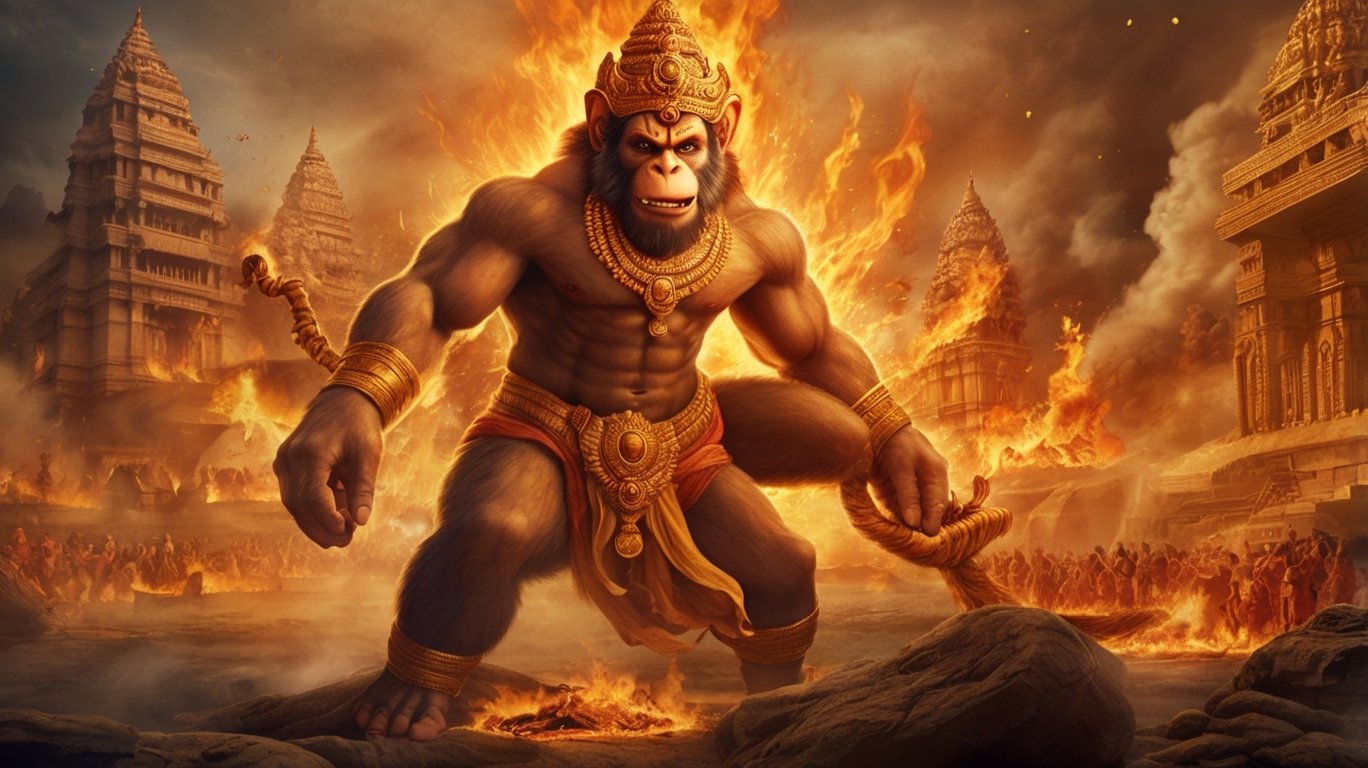Table of Contents
Within Hinduism, Lord Hanuman is revered as the embodiment of unshakable devotion, bravery, and selfless service. For decades, his unending bravery and energy have motivated followers, and his tales of perseverance and fortitude have a special place in the hearts of many. Bajrang Baan is one of the most powerful and highly respected invocations among the numerous hymns and mantras devoted to him. Those who want divine intervention to take away barriers, anxieties, and negativity from their lives recite this potent prayer.
Understanding the Significance of Bajrang Baan in English
There is more to Bajrang Baan than just a hymn. This is a powerful prayer asking Lord Hanuman to drive out evil spirits, shield the devotee, and give them courage and strength. The word Baan signifies an arrow, while the name Bajrang relates to Hanuman, whose body is as powerful as a thunderbolt (Vajra). The prayer is compared symbolically to an arrow that is meant to drive out obstacles, fear, and darkness from one’s life.
It is said that reciting the Bajrang Baan will call forth Hanuman Ji’s prompt protection and care, particularly in moments of mental or spiritual upheaval. It assists those in need of comfort by carrying a potent vibration of bravery, ferocity, and vitality. Please refer to Bajrang Baan FAQs to learn answer the question you might have.
Origin and History of Bajrang Baan
The poet-saint Tulsidas, who also wrote the Hanuman Chalisa, is credited for writing Bajrang Baan. Bajrang Baan is just as powerful as the Chalisa, although being less well-known. When a devotee is in dire need of instant heavenly intervention, it is frequently recited. The Bajrang Baan, which calls on Lord Hanuman to defeat adversaries and all sorts of evil, is more of a battle cry for his intervention than the Hanuman Chalisa, which is seen as a soft and devotional poem.
Structure and Meaning of Bajrang Baan
The Bajrang Baan is composed of lyrics that honor Lord Hanuman’s bravery and devotion to Lord Rama. It is written in the Hindi dialect of Awadhi. The prayer focuses on Hanuman Ji’s capacity to vanquish all evil forces and overcome any challenge. When one feels surrounded by hardships, both material and spiritual, they frequently recite it.

Every stanza is a direct cry for assistance, pleading with Hanuman Ji to arrive soon and intervene. Hanuman’s pledge to always be there for his devotees is shown in the sentence “संकट से हनुमान छुड़ावै, मन क्रम वचन ध्यान जो लावै” (Hanuman Ji removes all troubles for those who concentrate on him with their mind, deeds, and words).
Why Recite Bajrang Baan?
When in need, devotees go to the Bajrang Baan for a variety of reasons:
- To Remove Barriers: Bajrang Baan is believed to be able to eliminate any kind of barrier to advancement, be it material, psychological, or bodily.
- To Guard Against Harmful Energies: The devotee is shielded from bad spirits, unfavorable ideas, and damaging influences by the prayer.
- To Obtain Bravery and Fortitude: The devotee gains inner strength, mental clarity, and the bravery to take on life’s obstacles by reciting this song.
- For Immediate Help: It is believed by devotees that Hanuman Ji provides instant relief and assistance when called upon through the Bajrang Baan.
When to Recite Bajrang Baan
Although Bajrang Baan can be chanted at any time, the following exercises can enhance its benefits:
- Days of Recitation: Reciting Bajrang Baan on Tuesdays and Saturdays is highly encouraged as these days are thought to be particularly beneficial for Lord Hanuman.
- Place of Worship: It is best to recite Bajrang Baan in front of an idol or portrait of Hanuman in a calm, tidy setting.
- Purity of Mind and Body: In order to harmonize with the energy of the prayer, it is thought that before singing the hymn, one should cleanse their body and mind.
- Mindfulness & Focus: To completely engage in the prayer, one should set aside all outside distractions and direct all of their thoughts and emotions toward Hanuman Ji.
Bajrang Baan in Hindi and English
Since Bajrang Baan is a customary prayer, many people would rather repeat it in Hindi, which is the language most closely related to the original Awadhi composition.
Nischay prem prteet te vinay kare sanman | Tehi ke karaj sakal shubh sidh kare hanuman
Jai hanumant sant hitkari | sun lije prabhu vinay hamari
jan ke kaaj vilamb na kijey | aatur dauri mahasukh dijey ||
Jaise kudi sindhu ke para | sursa badan paithi vistara
aage jaay lankani roka | Marehu laat gai sur loka ||
jaay vibhishan ko sukh dinha | Seeta nirikh parampad linha
baag ujari sindhu mah mora | ati aatur jam kaatar tora ||
akshya kumar maari sanhara | loom lapet lank ko jara
laah saman lank jari gai | jai jai dhuni surpur nabh gayi ||
ab vilamb kehi karan swami | kripa karhu ur antaryami
jai jai lakhan pran ke data | aatur hai dukh karhu nipata ||
jai hanuman jaiti balsagar | Sur Samuh samrath bhatnagar
hanu hanu hanu hanumant hathile | bairihi maaru brij ke kile ||
Hrin Hrin Hrin hanumant kapisa | Hun Hun Hun hanu ari ur sisa
jai anjani kumar balwanta | sankarsuwan veer hanumant ||
badan karal kaal kul ghalak | ram sahay sada prati palak
bhoot pret pishach nisachar | agni betal kaal maari mar ||
Enhe maru tohe sapath raam ki | Raakhu naath marjaad naam ki
Satya hahu hari sapath paay ke | ramdoot dharu maaru dhaay ke ||
Jai Jai Jai hanumant agadha | dukh paavat jan ke he apradha
pooja jap tap name achara | nahi jaanat kachu daas tumhara ||
van upwan mag giri grah maahi | tumhare bal ham darpat nahi
jankasuta hari daas kahavo | ta ki sapath vilamb na lavo ||
jai jai jai dhuni hot akasa | sumirat hoy dusah dukh naasa
charan pakri kar jori manavo | yeh ausar ab kehi gohravo ||
uth uth chalu tohi ram dohai | paay paro kar jori manayi
cham cham cham cham chapal chalanta | hanu hanu hanu hanu hanu hanumanta ||
hann hann haank det kapi chanchal | sann sann sahami parane khal dal
apne jan ko turat oobaro | Sumirat hoy aanand hamaro
yah bajrang baan jehi maare | taahi kaho phir kawan oobare
paath kare bajrang baan ki | Hanumant raksha kare praan ki
yeh bajrang baan jo jaape | Taaso bhoot pret sang kaampe
dhoop dey jo jape hamesha | Ta ke tan nahi rahe kalesha
||ur prateet dradh saran hai, paath kare dhari dhyan | Baadha sab har kare shubh, kaam sakal hanuman ||
Benefits of Bajrang Baan for Spirituality
Reciting Bajrang Baan is believed to have several psychological and spiritual advantages.
- Spiritual Defense: One of the primary goals of reciting Bajrang Baan is to shield oneself from negative energies, bad forces, and damaging effects. It serves as a shield for the soul.
- Mental Calm: Regularly chanting Bajrang Baan promotes mental clarity and relaxation while lowering tension and anxiety.
- Increasing Devotion: The prayer increases one’s relationship with Hanuman Ji and bestows many rewards.
- Overcoming anxieties: It provides strength and resilience to the heart by helping to overcome internal anxieties and insecurities.
Conculsion
The Bajrang Baan is a special and potent prayer that is very important to Lord Hanuman’s followers. In addition to acting as a spiritual barrier, it gives people the confidence and bravery to face life’s obstacles head-on. The Bajrang Baan is a go-to prayer whether you want to strengthen your bond with Hanuman Ji, clear barriers from your path, or just be protected from harmful energy.
For those who would like to incorporate this holy song into their regular spiritual routine, you can conveniently download the Bajrang Baan PDF in either Hindi or English. By reciting this potent prayer with faith and dedication, one can access Lord Hanuman’s blessings, protection, and strength.
An arrow from the devotional bow, Bajrang Baan, is directed directly into the heart of the ever-watchful Lord Hanuman, bringing with it the immediate intervention of heavenly favor and protection.
Bajrang Baan FAQs
To better understand the significance and practice of Bajrang Baan, the following frequently asked questions (FAQs) have been provided:
Describe Bajrang Baan and explain its significance
A potent hymn calling for Lord Hanuman’s defense, might, and intervention is Bajrang Baan. Because it invokes Hanuman Ji to remove barriers, vanquish bad forces, and quickly aid the devotee in times of need, it is regarded as significant. Because of the prayer’s strong energy and capacity to bestow courage, tranquility, and protection, it is greatly valued.
When is the right time to recite Bajrang Baan?
Though Bajrang Baan can be chanted at any time, Tuesdays and Saturdays are thought to be auspicious days for worship, therefore doing so is particularly beneficial.
What distinguishes Hanuman Chalisa from Bajrang Baan?
Though they are both devotional songs to Lord Hanuman, Bajrang Baan and Hanuman Chalisa have different themes and objectives. The Hanuman Chalisa is more of a mild prayer that celebrates Hanuman Ji’s virtues and devotion to Lord Rama, whereas the Bajrang Baan is a forceful and urgent cry for protection and the removal of impediments. Reciting Bajrang Baan is usually done when someone is in dire need of assistance or is struggling greatly.
Can one chant Bajrang Baan every day?
Regarding the daily recitation of Bajrang Baan, different texts have differing viewpoints. There are differing opinions regarding the benefits of regular chanting for devotees who are seeking Lord Hanuman’s unshakable power and protection. Some advise against reciting Bajrang Baan every day and instead suggest saving it for emergencies or unique difficulties.
When chanted on a daily basis, Bajrang Baan can be an effective means for devotees to invoke protection, peace of mind, and respite from difficulties. But it’s crucial to approach the prayer with utmost reverence, paying attention to the meaning and intention underlying its recital. It is recommended that devotees use their own discernment or counsel with spiritual advisors when determining how often to repeat this potent song.
How can reciting Bajrang Baan help one?
There are many advantages of reciting Bajrang Baan, including:
- Defense against hostile forces and malevolent spirits.
- Elimination of barriers and challenges.
- Inner fortitude, bravery, and tenacity in the face of difficulties.
- Emotional stability and mental tranquility.
- Spiritual development and increased adoration for Lord Hanuman.
Does Bajrang Baan have a Hindi translation?
Indeed, as Hindi is more closely related to the original Awadhi language in which the hymn was created, many followers prefer to chant Bajrang Baan in that language. Reciting it in Hindi deepens one’s connection to the prayer’s spiritual core and improves the religious experience.
From where can I get the PDF of Bajrang Baan?
A variety of spiritual blogs, portals, and religious websites offer the Bajrang Baan in English PDF & Bajrang Baan in Hindi PDF for easy download. You can download the prayer for offline reading and frequent recitation from several of these websites that provide Bajrang Baan in both Hindi and English translations. All you have to do is look up Bajrang Baan PDF in your language of choice, and you’ll find a number of free download alternatives.
Does reciting Bajrang Baan require any special preparation?
Although it’s not required, it’s best to be mentally and physically clear before reciting Bajrang Baan. The efficacy and potency of the prayer are increased by taking a bath, finding a quiet place to meditate, and directing all of your attention toward Lord Hanuman with purity of heart.
Is it possible to overcome worry and dread using Bajrang Baan?
Reciting Bajrang Baan is said to assist many followers get over their worries, anxieties, and emotional upheaval. By calling upon Lord Hanuman’s bravery, strength, and protection, the prayer makes the devotee feel more safe and at ease.
Read Also
Sundarkand Part 1 | Sundarkand Part 2 | Sundarkand Part 3 | Sundarkand Part 4 | Sundarkand Part 5 | Sundarkand Part 6 | Sundarkand Part 7 | Sundarkand Part 8 | Sundarkand Part 9 | Sundarkand Part 10
Important Links
Hanuman Chalisa in Hindi | Hanuman Chalisa in Kannada |Hanuman Chalisa in Bengali | Hanuman Ashtak | Hanuman Chalisa in Assamese







